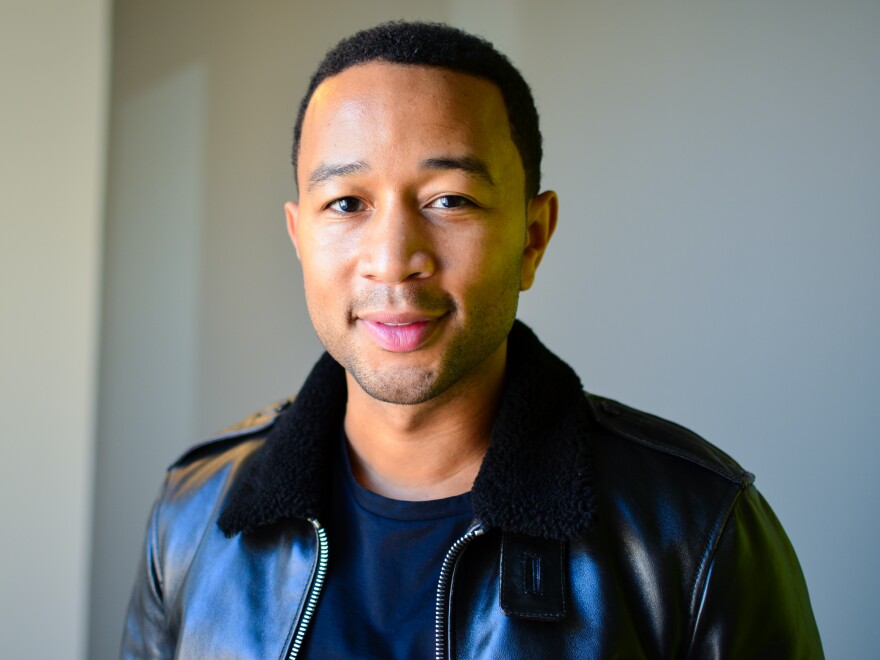John Legend is already an R&B legend, even at a relatively young age. His buttery sound and sexy lyrics have earned him nine Grammy awards. But it's been awhile since he has delivered a solo album, and one with all of his own original material. But now he is back, with an album called Love in the Future.
Legend spoke with Tell Me Morehost Michel Martin about working with his wife, Chrissy Teigen, and Kanye West; where he draws the line between sexy and sleazy; and why the new film 12 Years a Slavehits home.
Interview Highlights
On the aim of Love in the Future
My only goal was to try to make a really beautiful modern soul album. And when I thought about what that meant to me, I understand the tradition that I come from, and the music that I grew up listening to, and I love it and I appreciate it. But I also wanted to take it forward, continue to make it feel fresh, not just kind of a nostalgic music but a music of now and of the future.
When we settled on a theme and a title for the album, it made sense having just got married — and during the time I was making the album, I was planning to get married — to write, you know, about looking forward to a future with someone. And to write about being in love. And to write an ode to being in love.
On including his wife and footage of their wedding in his "All of Me" music video
I felt like it's something we're sharing, and it made so much sense with the song. ... And then even the fact that the director of the video was the guy that introduced us seven years ago. We couldn't not put it in there. It was just a full circle moment that just made sense.
On the line between sexy and sleazy
My line is probably a little more conservative than some of my compatriots in the business [laughs]. ... It comes down to me knowing who I am, and knowing how I want to be seen in the world, how I wanted to discuss things. And for me to try to sound like this or that artist that is a little more kind of racy and raunchy, it just doesn't sound right coming out of me.
On working with Kanye West
We've really been working together — collaborating, writing songs together — since late 2001. Only he and Dave Tozer, both who co-executive produced the album, have I worked with for that long stretch of time with that level of depth.
I think he is outspoken. He is opinionated. So when people read that from his public behavior, that's a true thing. But he's such a generous collaborator in the sense that he really is obsessed with making great art. And he was so excited to work on this album. He gathered all the producers that worked on the project and said, 'Our goal is to give John the album of the year.' And I look at him as one of the few geniuses that I know creatively — someone who just has so many interesting ideas that are different from other people's ideas.
He'll just tell you if he doesn't like a song. ... I think it's good to have somebody like that around you if you're trying to make something great.
On celebrating his risky path to success and whether kids should follow in his footsteps
For me, even choosing to be John Legend, and to be who I am as a star, as an artist, it's a risk. 'Cause you know, I graduated from college and worked as a management consultant. And I could've had this very buttoned-up life and wearing suits to work every day. I could've done very well for myself. But I chose a more risky path and a more kind of flashy path as well. Taking that risk meant that the possibly of failure was high, but the possibility of reward was worth it for me.
I do speak to kids a lot. I am very clear with them that not all of them should aspire to be me and not all of them should aspire to be LeBron. We have a responsibly as ... a society to make sure that the only examples of success that they see aren't me and LeBron. So that they see a clear path out of poverty, out of, you know, a tough life.
On his family's connection to the film 12 Years a Slave(for which he produced the soundtrack)
It's like long overdue because this is the first film that we've told from the slave's perspective about such an important era in American history. Finally we have a black director telling the story of a slave written by the slave, and he does it in such a beautiful, powerful, moving way.
The story in the film of a man getting kidnapped into slavery is actually personal to my family. When I was on Finding Your Rootswith Henry Louis Gates, he told me the story, which I never heard, of some of my ancestors in Ohio getting kidnapped back into the South, and being enslaved when they had been freed by their former master who had passed away and guaranteed them their freedom in his will. They got kidnapped by some of his family members back into slavery, and the state of Ohio had to fight for their freedom. And they eventually won it. And so when I found out about the 12 Years a Slave narrative, it was not too many months after I'd found out about what happened to my family. So it was particularly relevant to me.
Copyright 2021 NPR. To see more, visit https://www.npr.org. 9(MDAxODc1ODA5MDEyMjg1MDYxNTFiZTgwZg004))


